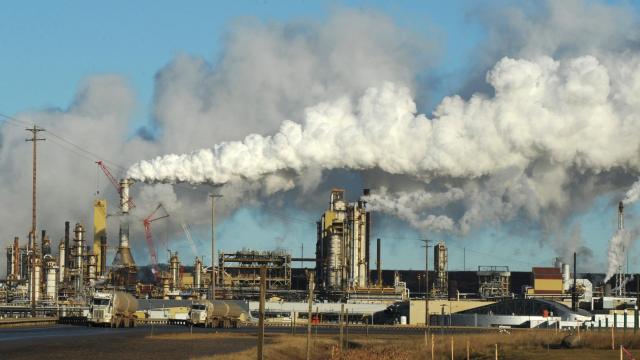“Climate champion” and producing more than 10 million barrels of tar sands oil a year are not exactly synonymous in most people’s minds. But that’s the exact title the British government decided to bestow on an executive at one of the most powerful oil companies in Canada.
To mark six months until the major climate conference in Glasgow, the UK government honoured 26 “climate champions” working in Canada, a commonwealth nation. Among the list of “champions” is Martha Hall Findlay, who serves as the chief sustainability officer at Suncor, a major tar sands player. An accompanying “storybook” of all the chosen climate champions includes Findlay’s resume as well as a quote attributed to her: “Suncor fully supports Canada’s Paris Agreement commitments, and we look forward to COP26 to continue building the all-important collaboration among the private sector, governments and other organisations needed to find real solutions.”
The choices for climate champions weren’t made by any member of Canada’s robust climate activist community, but rather by the British High Commission in Canada and the Canada Climate Law Initiative. Climate Home, which first reported last week, reports they won’t have any formal role at COP itself. And Findlay herself certainly has an impressive resume — there’s nothing in there at first glance that’s a red flag (outside the working for an oil company thing), and I’m sure she’s a nice lady. But the cognitive dissonance of appointing an executive at one of the dirtiest companies in the world as a climate champion is pretty jarring.
Suncor may not be as recognisable a name to American readers as Exxon or Chevron, but its hands are plenty dirty. The company is the top global producer of tar sands oil. Alberta is the epicentre of tar sands production, and the operations there form the largest industrial project in the world. Tar sands are also wildly polluting, resulting in three times the emissions as regular ol’ crude production. While Suncor rakes in money from its oil sands operations — it’s the second biggest energy company in Canada — its product has made it a challenge for Canada to meet its climate goals. In fact, Canadian greenhouse gas emissions rose slightly in 2019 due to more oil and gas extraction even as other developed nations have seen theirs fall in recent years.
Like many of the world’s fossil fuel companies who are trying to earn brownie points for helping us stave off the climate disaster they caused, Suncor’s website presents a squeaky-clean image of a corporation that is Committed To Acting On Climate. “Suncor accepts the scientific consensus, publicly stating that ‘climate change is happening and we need to take action,’” its climate page reads. Links to the company’s various sustainability reports detail its plan to reduce emissions 30% over the next decade and it aims to “embed low-carbon thinking into the day-to-day activities and decisions of our employees” (whatever that means). Suncor is in favour of Canada’s national price on carbon — a common show of support among oil companies — and its then-CEO in 2018 dragged politicians who dabble in climate denial.
Suncor has also worked hard to cultivate its relationships with Indigenous and First Nations groups, many of whom are on the front lines of the environmental devastation from the impacts of oil sands extraction and who have led public campaigns and lawsuits against other tar sands companies, like the owners of the Trans Mountain Pipeline. In 2019, Bloomberg called the company “an industry leader when it comes to business partnerships with Indigenous groups.” (One of Findlay’s listed duties, according to the company’s website, is being “responsible for the continued deepening of the company’s Indigenous, stakeholder, and community relations.”)
All of this is great for Suncor, but, as the old adage goes, you can put lipstick on a pig — it’s still a pig. There are oil companies that are doing better than others at trying to clean up some of the mess they’ve made — and Suncor looks like it’s doing its homework to become the best little oil company it can be. Indeed, the industry as a whole has made concerted efforts over the past year to right its sinking PR ship, introducing confusing terms like “carbon management company” and “net-zero oil” to help buy them a little time to keep polluting.
At the end of the day, however, like Exxon, Chevron, and all the others, Suncor is still a company that produces an enormous amount of oil each year, with no plans to stop soon, despite our ticking carbon clock. People who work for the company, no matter how noble their intentions or how embedded their “low-carbon thinking” is, are helping further that goal. If these are the kinds of “climate champions” that governments are honouring as the world prepares to gather for what will be a crucial climate conference to hammer out details of the Paris Agreement, we may be in trouble.
